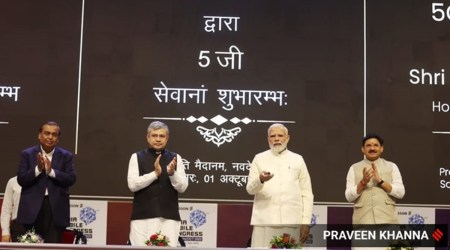- India
- International
In Jaipur, a question for WhatsApp: How to track the source?
They discussed verification methods through news searches, reverse image searches and fact-checking organisations as well as technical features.
 At the WhatsApp-funded workshop in Jaipur. WhatsApp/DEF
At the WhatsApp-funded workshop in Jaipur. WhatsApp/DEF
The question came up again and again. “If a WhatsApp message comes to the police, how can we find the original sender of the message?” asked Naveen Rana, an IT cell member from the office of the Deputy Commissioner of Police in Jaipur. “If we don’t have the data, how can we share it?” Pragya Misra Mehrishi, WhatsApp’s India policy communications manager, responded.
After being informed about “encryption,” which prevents the company from seeing the content of WhatsApp messages, Rana asked: “Isn’t there any other option?” Mehrishi replied: “Sir, I’m trying to help you understand. We can’t see the content. It’s not that we don’t want to give it.”
On Monday, in a two-hour workshop conducted in Jaipur, the company’s local NGO partner Digital Empowerment Foundation presented the WhatsApp-developed “fake news curriculum” to an audience of around 100 police officers, IT professionals, law students, and community members. They discussed verification methods through news searches, reverse image searches and fact-checking organisations as well as technical features.
Launched in September, the partnership has conducted 18 workshops funded by WhatsApp for a total of 1,300 people in at least two districts each of the five election states: Chhattisgarh, Rajasthan, Mizoram, Madhya Pradesh and Telangana. They aim to expand to states that “have seen disturbing incidents of fake news”, such as Assam, Maharashtra and Karnataka, by March, said DEF founder Osama Manzar.
READ | EC, social media firms should together take on fake news: ex-CEC

In a survey with over 1,000 respondents across rural India released this month, DEF found that over half of them believed that viral WhatsApp messages could lead to incidents of violence. Less than five per cent said they question the sender about information in messages labelled as “Forward”. And over 60 per cent said there is rarely ever a source mentioned for the news they receive on WhatsApp. “They understand the concept of fake news but there is still a vacuum (in understanding) the gravity that news can have,” DEF media and communications head Ravi Guria, who is heading the partnership with WhatsApp, said. “It’s not just about one person forwarding a message.”
WhatsApp came under the spotlight when a spate of lynchings across the country, killing at least 33 people, were linked to rumours circulating on the platform. Over the summer, the IT Ministry urged the company to take action in two separate letters, to which the company replied with product and organisational changes, including campaigns like this.
After Monday’s session, Mehrishi faced more questions about finding the culprit of “fake news”. She encouraged the police officers to establish a WhatsApp business account to get official messages from the public, and to share fact-checks on their own social media accounts.
Some in the audience, including DCP Mahaveer Singh, wanted more. “We intercept. The criminal says to call on WhatsApp. That’s it, we can’t track,” Singh said. When Mehrishi responded that WhatsApp conducts dedicated law enforcement training, Singh said, “That, you are giving to people from Delhi and Gurgaon. Not one person from Rajasthan has been called.”
Singh said he has built a new 20-person social media cell for the Rajasthan elections, with 24/7 social media monitoring, including of community WhatsApp groups.
Other attendees were satisfied with WhatsApp’s efforts, such as limiting forwards to five numbers. The Rajasthan election commission’s officer on special duty, Rakesh Kumar Sahni, said that in any case, social change is preferable to band-aid technological solutions. “For fake news in WhatsApp, from the point of view of elections, prevention is the only solution,” he said.
Multiple attendees referred to a “fake news incident” in Ramganj Sunday, in which some residents tried to raise religious flags, and a traffic accident involving a Hindu and a Muslim that led to stone pelting. Rumours flew that police had imposed curfew and fired pellet guns. The solution? The “law and order machinery took the responsible response” by simply shutting down the Internet in that area, said Sahni.
Apr 26: Latest News
- 01
- 02
- 03
- 04
- 05








































